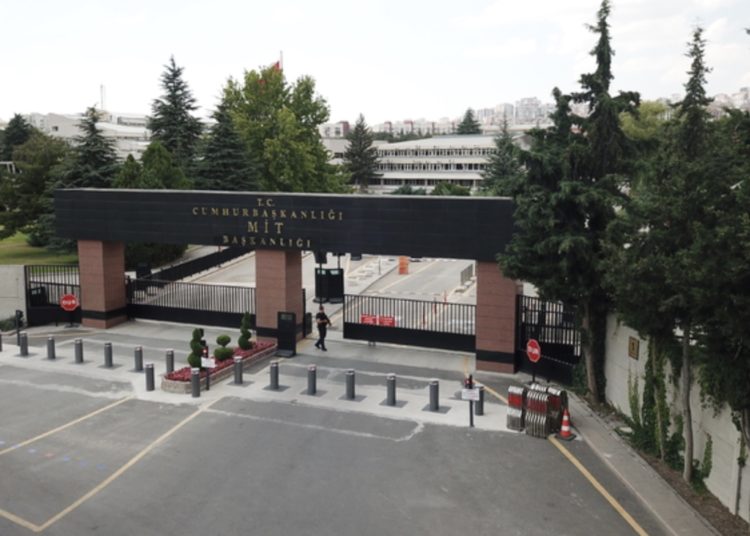Abdullah Bozkurt/Stockholm
A top-secret Turkish intelligence report effectively cleared a former employee of serious charges leveled by a prosecutor concerning his alleged involvement in the assassination of Russian Ambassador Andrei Karlov in December 2016.
The classified internal inspection report, obtained by Nordic Monitor, did not say a single word about former employee Vehbi Kürşad Akalın’s alleged complicity in abetting the murder of the Russian envoy by a jihadist Turkish police officer. The 22-page report, stamped top secret, included deep background information on Akalın, a low-level National Intelligence Organization (MIT) employee who was dismissed over his alleged links to the Gülen movement, a group highly critical of the government.
“On March 23, 2018, at the request of the prosecutor during the investigation phase, MIT sent a report about me. … There’s nothing there about me with regard to the murder,” Akalın told the panel of judges at the Ankara 2nd High Criminal Court on January 17, 2020. He said MIT must have looked under every stone while investigating his life, examined everything he did on his computer at MIT headquarters since he began his job with the agency and found nothing incriminating.
“All the operations I have done on my computer since the day I started work at the agency have probably been minutely examined by MIT. As a result, no solid evidence of spying has ever been found by MIT. If it had been discovered, the inspection board report would not have read as it does. No information exists indicating that I was spying either for the plot to assassinate the ambassador or any other matters related to my assignment because there simply are no such data,” he told the court at another hearing on September 4, 2020.
Testimony of Vehbi Kürşad Akalın in court:
The revelations cast suspicion on the credibility of the investigation into the murder of the Russian ambassador and further reinforced the view that the government of President Recep Tayyip Erdoğan had been trying to distance the case from pro-government jihadist groups and radical figures who played an instrumental role in radicalizing the young police officer, Mevlüt Mert Altıntaş.
MIT’s inspection report even concluded that the background information and Akalın’s circle of friends did not warrant the agency filing a criminal complaint against him given the fact that the information “verbally” conveyed by the police about him did not produce any solid leads that would survive the scrutiny of the court. The MIT report underlined that it found no evidence that he worked with the Gülen movement.
Akalın repeatedly filed motions with the court asking them to order the police to reveal the source of information that alleged his links to the Gülen movement and that was verbally communicated to the agency, but the judges declined his request and did not bother finding out how and who provided the information that he was a Gülenist. He noted that there was no record anywhere about who said what, when and where, yet his entire life was turned upside down over this word-of-mouth communication.

Apparently, MIT as well was not comfortable with the police information and made clear that the source of Akalın’s alleged affiliation with the movement came from the police, not in written format but verbally and was not corroborated by its own intelligence. In the end the agency decided to not base its decision on that information.
The only recorded information about him came from a suspect named Hüseyin Kötüce a month after Akalın’s suspension from MIT on word of mouth “evidence.” It turned out that Kötüce’s statement was fabricated after he was abducted, tortured and kept at a black site run by MIT in Ankara. During the trial Kötüce, who was accused of collecting information about the Russian ambassador from Akalın, revealed how he was forced to sign the prepared statement to incriminate Akalın, testified that he did not know the MIT agent at all and recanted his earlier statements that were clearly taken under duress.
The MIT inquiry report also noted that Akalın was not provided any opportunity to defend himself against the accusations during an administrative probe within MIT, suggesting that the decision to fire him and make him a scapegoat in the assassination case had been made in advance. He was nothing but a fall guy on whom the government could pin serious accusations in the assassination case, deflect the probe away from people close to the government and scapegoat Erdoğan’s opponents in the Gülen group.
Conclusion page of top-secret MIT report admitting that no solid evidence was found to warrant a criminal investigation into Vehbi Kürşad Akalın over his alleged affiliation with the Gülen movement:
His employment record at MIT shows that Akalın was not actually a high-profile intelligence officer. He was a rookie in an entry level job and was working as an assistant specialist on the Russian desk. Before joining the agency at the age of 26 on April 21, 2014, he had briefly worked at the Ministry of Education, followed by an entry level job at the Foreign Ministry for eight or nine months.
When a recruitment invitation came from the spy agency, he competed in the exams and was successful. He was given agency ID code M-12640 and started work, trying to learn the ropes in the agency. After his training, he was assigned to the Russia desk in February 2015.
Interestingly enough, Akalın was part of the team that investigated the murder and looked at the profile of the assassin. He pointed out how the police officer was quickly radicalized by several imams and had sent funds to radical organizations including ones linked to al-Qaeda. The imams and radical organizations were close to the government, and some were actually on the government payroll, working in an official capacity at the Directorate of Religious Affairs (Diyanet). On May 1, 2017 he was suddenly suspended with no explanation, fired on June 13, 2017 and jailed on September 26, 2017.
Prosecutor’s indictment reveals that a background check on Akalın and his first-degree relatives did not indicate that he was in any way linked to the Gülen movement:
The injection of Akalın as a suspect in Karlov murder case appears to have deliberately been done by the MIT agents who were present during his interrogation at the police department and deposition at the prosecutor’s office, although it was unlawful for them to be present under the Code on Criminal Procedure (CMUK). In his court testimony Akalın said he was ready to name the intelligence officers who had forced him to sign a false confession under torture and asked the court to obtain courthouse surveillance footage around the time he was brought to the prosecutor’s office in order to identify the agents. The court, however, declined his request.
The cell phone records, bank wires and computer logs obtained for the assassin Altıntaş as well as witness statements all pointed to several radical clerics who either worked for the Turkish government’s religious authority, the Diyanet, or were long supported by the office of President Erdoğan as accomplices in the murder. Yet, none of them were investigated or indicted by the prosecutor.
Full text of top secret MIT report about Vehbi Kürşad Akalın [Turkish identity numbers were redacted by Nordic Monitor]:
The prosecutor’s claims collapsed when the trial started and key defendants recanted their earlier statements extracted under duress and submitted medical reports to prove they had endured torture and ill-treatment until they agreed to sign false statements. Many government witnesses did not show up for cross-examination despite repeated motions from the defense lawyers and defendants. Those who appeared in court provided conflicting statements, while some recanted earlier statements they had given to the police.
There are a number of pieces of evidence in the case file that show the killer was in fact radicalized by jihadist literature, attended prayer circles organized by pro-government jihadist cleric Nurettin Yıldız and had been befriended by known al-Qaeda militants. However, the government did not pursue the leads into jihadist networks and did not investigate the al-Qaeda figures who had worked with the killer. It was also revealed that the Erdoğan government rewarded the killer with 34 bonuses in two years’ time.












